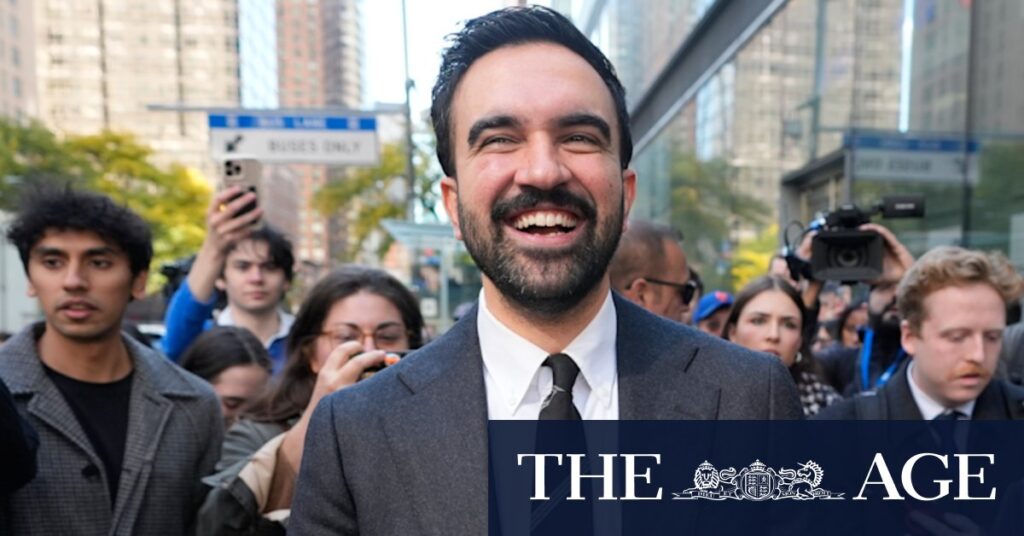
New York City is on the brink of a historic mayoral election, with Zohran Mamdani poised to potentially become the first Muslim mayor of the city and the second democratic socialist to lead America’s largest metropolis. As the city gears up for the election, Mamdani’s campaign has captured national and international attention, symbolizing a shift in political dynamics.
On the eve of Halloween, a vibrant scene unfolds in Brooklyn, where a “party with purpose” is underway. Organized by Hot Girls For Zohran, an unofficial grassroots campaign group, the event is not just a festive gathering but a rallying point for Mamdani’s supporters. Volunteers clad in campaign shirts advocating for rent freezes and a $30 minimum wage mingle with attendees, while QR codes offer a gateway to joining the campaign efforts.
A Polarizing Figure in a Divided Political Landscape
Mamdani, a 34-year-old state assembly member, has rapidly risen to prominence after securing a decisive victory in the Democratic primary. His campaign, characterized by its progressive platform and savvy use of social media, has resonated with young voters, positioning him as a counterpoint to Trumpism. However, his background and policies have also sparked controversy, drawing criticism from various quarters.
Some Republicans have questioned Mamdani’s citizenship, given his Ugandan birth and naturalization in 2018. Former President Donald Trump has labeled him a “100% Communist Lunatic,” threatening to withhold federal funding if Mamdani is elected. These attacks underscore the polarizing nature of Mamdani’s candidacy, which has become a focal point for broader debates within the Democratic Party.
The Democratic Party at a Crossroads
Mamdani’s rise highlights tensions within the Democratic Party, particularly in the wake of the Biden administration. His campaign reflects both the challenges and opportunities facing the party as it seeks to reconnect with voters in a post-Trump era. Conservative columnist Miranda Devine has described Mamdani as “Joe Biden’s parting gift to his party,” emphasizing the dissatisfaction among young voters with the current political establishment.
“In the Democratic Party, young voters have been so badly let down,” Devine stated during a recent debate. “They’ve had a gerontocracy in Washington running everything – the Democratic establishment is just a decayed, corrupt rump.”
Facing Mamdani in the election are former New York governor Andrew Cuomo and Republican Curtis Sliwa. Polls from Emerson College and Marist University show Mamdani with a significant lead over Cuomo, who is running as an independent with backing from the Democratic establishment.
Local Issues Take Center Stage
While national discourse often frames Mamdani as a socialist bogeyman, his campaign is deeply rooted in local issues, particularly affordability. New York City has seen a surge in living costs, with median rents far exceeding the national average. Mamdani’s policy proposals aim to address these challenges through wealth redistribution and increased services for the poor.
The New York Times estimates Mamdani’s policies would cost about $7 billion annually, with universal childcare alone accounting for $6 billion.
To fund these initiatives, Mamdani proposes raising the top corporate tax rate and increasing city income tax for high earners. His supporters argue that these measures are necessary to tackle the city’s affordability crisis and are broadly popular among voters.
Critics and Supporters Weigh In
Despite the popularity of his policies, Mamdani faces criticism from various quarters. Billionaire investor Bill Ackman has voiced opposition, arguing that Mamdani’s policies would harm the city’s economy and drive businesses away. However, supporters like Democratic activist Lindsey Boylan contend that Mamdani’s opponents focus on his past positions to distract from his substantive plans.
“These are all things that have been tried, have been done before,” Boylan asserts. “But because people don’t like that, and [because] it will mean more burden on our wealthiest, people try to make him seem extreme.”
Mamdani has sought to moderate his positions, pledging to maintain police funding and retain the current police commissioner. He acknowledges the skepticism surrounding his campaign but remains committed to clarifying his intentions.
A New Direction for New York?
As election day approaches, Mamdani’s campaign continues to gain momentum. High-profile endorsements from figures like Alexandria Ocasio-Cortez and Bernie Sanders bolster his candidacy, while grassroots efforts like Hot Girls For Zohran energize his base. However, the campaign to stop Mamdani is equally fervent, with substantial backing from business interests and political figures like Michael Bloomberg.
The outcome of this election will have significant implications for New York City and beyond. Mamdani’s potential victory could set the city on a collision course with federal and state administrations, particularly regarding issues like taxation and immigration.
Ross Barkan, an author and Mamdani associate, captures the sentiment: “This is, in every sense, a change election, and New Yorkers are largely excited to see what comes next.”
As New Yorkers prepare to cast their votes, the stakes are high, and the city’s future direction hangs in the balance. The election not only reflects the city’s immediate challenges but also serves as a barometer for broader political shifts in the United States.







